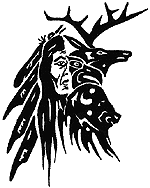LIFE BEFORE..........When people first arrived in the Americas, they were big game hunters. Their chief source of food was the mammoth, mastodons, and giant bison which were likely followed here from Asia. The animals had grown to such enormous sizes as a response to conditions of the Ice Age. With the coming of a warmer climate near the end of the Ice Age, about 10 000 years ago, people began to spread out across the continents. This climate change, along with the development of greater hunting skills, led to the extinction of Ice Age animals. On the prairies hunters stalked the buffalo, a descendant of the giant bison, and in the north they hunted caribou. In the woodland areas the people hunted a variety of game including deer, moose, bear and a wide variety of smaller animals and fish. Some forms of hunting called for a high degree of co-operation and organization, which sometimes involved hunters from different tribes working together. The harshness of the environment and the quest for survival thus necessitated inter- tribal co-operation and led to the development of highly oganized trading rituals and practices. Alliances were formed and hostilities developed among the many different cultural groups so that tribal warfare was not altogether uncommon. Greater reliance on agriculture, which began in Mexico and later in South America, had also spread into parts of North America. By 500 AD, the cultivation of plants had reached the Iroquoins. Fewer people relied on traditional hunting and gathering practices in areas where the soil was fertile and growing seasons were longer. 
Agricultural development allowed people to live together in larger communities and to concentrate on more than just the simple need for survival. Arts and politics began to play a bigger role in community life. By the time the first Europeans arrived in North America they would encounter groups with rich cultural traditions and advanced political structures. |